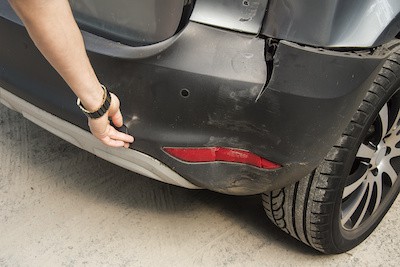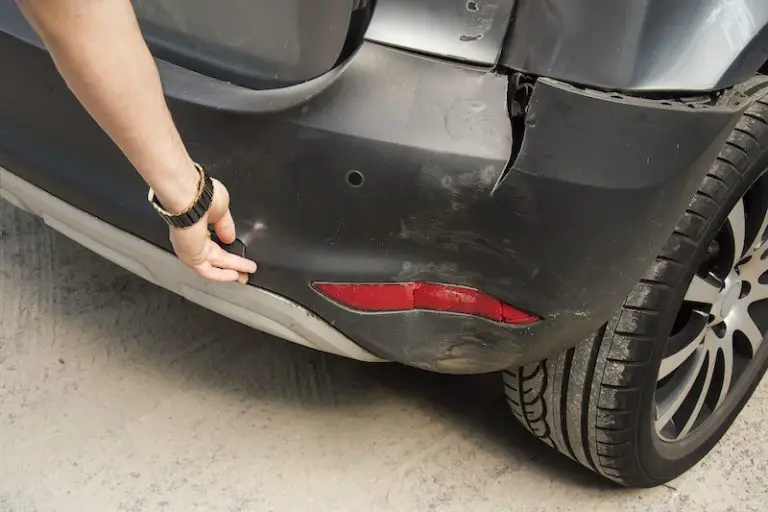What Happens When You Hit a Curb?
What happens when you hear the dreaded clunk of your tires slamming into an unexpected curb and the proceeding deflation of your tire? Unfortunately, hitting a curb is a common issue that often means getting a new tire. It’s a frustrating experience when your vehicle hits a curb, and you have to replace a tire, and it happens all too often to most of us who drive often.
So, will your insurance cover the cost of repair or replacement for your tire or any other damage done when you hit a curb? The answer most often depends upon what type of auto insurance coverage you have. If you have collision coverage, then hitting a curb will be covered. Ideally, you will have both comprehensive and collision auto insurance to protect yourself and your vehicle from paying everything out of pocket if you get into an accident or hit a curb that damages your car or tires.
Collision auto insurance will cover any impact on your vehicle from a stationary object. It also protects you if you were to hit another motor vehicle, or in the worst case, another person. Comprehensive auto coverage is different than collision coverage and will ensure various scenarios. It’s essential to understand the difference between comprehensive and collision auto insurance to determine what is best for you.
Why is Collision Insurance Important?
Collision coverage will help you take care of the impact caused by hitting a curb with your vehicle, as well as other types of impact. This coverage will cover the cost of damages to your car due to a collision. Whether that be with another vehicle, curb, or another object, collision insurance is excellent coverage to ensure your car is financially protected.
Collision insurance is not mandatory. And although it costs more, it provides valuable coverage. If an accident happens and you don’t have collision insurance, then you’ll need to pay out-of-pocket for the damage done due to the collision. Collision insurance will ensure that you aren’t paying for everything yourself, which is why it’s such an essential aspect of auto insurance.
Do You Need Both Collision and Comprehensive Auto Insurance?
 Both collision and comprehensive auto coverage are vital. However, only comprehensive auto insurance is often required by dealerships or banks to purchase if you have a vehicle. Both insurances are to ensure damages to your car are covered. Still, collision auto insurance will cover any damages due to impact no matter who is at fault. Comprehensive covers
Both collision and comprehensive auto coverage are vital. However, only comprehensive auto insurance is often required by dealerships or banks to purchase if you have a vehicle. Both insurances are to ensure damages to your car are covered. Still, collision auto insurance will cover any damages due to impact no matter who is at fault. Comprehensive covers
damage that is not involving a collision. Some people opt-out of using collision insurance, however, and have comprehensive auto insurance only. Keep reading to find out more about the best type of auto insurance for your situation.
Why Do You Need Collision Insurance?
As we’ve discussed, collision insurance pays for your car’s damage, whether a collision a curb, a pole, or another object. Collision coverage applies whether or not you are at fault in the accident.
Collision insurance is a financial safety net for if you get in an accident, hit a curb, or some other collision. Hitting an animal in the street is an exception to this policy, and is covered in comprehensive insurance, instead. Usually, car-owners will drop collision insurance if their car’s value isn’t enough to get a new vehicle if the vehicle is wrecked. However, if your car was wrecked and the compensated value would allow you to get another car or fix your vehicle adequately, collision insurance is a perfect option.
Why Do You Need Comprehensive Insurance?
Comprehensive auto insurance isn’t necessarily complete, and the name can be misleading for those buying auto insurance for the first time. Comprehensive insurance ensures physical damage when the vehicle is not in use. This auto insurance doesn’t cover normal wear and tear of time on a car or anything inside the car. Usually, comprehensive car insurance will cover hitting an animal, like a deer, when it runs into the road.
However, comprehensive won’t be covering any new upgrades you’d like for your vehicle. It also will not cover theft or vandalism by family members or employees. If you aren’t sure precisely what comprehensive coverage will look like, give your provider a call, and they can further explain their exact coverages.
Full Coverage vs. Liability Cost
With many insurance companies, collision and comprehensive insurance will be bundled together into one package. While only buying one of the coverages might still be cheaper, there’s often a discount for purchasing both coverages for your vehicle.
Liability coverage is legally required and helps protect anyone or anything that’s harmed in an accident with your vehicle. If you opt for full coverage auto insurance, you’ll have collision, comprehensive, and liability insurance.
Despite its name, comprehensive auto insurance does not offer complete coverage. Full coverage, however, is your best bet if you’re looking for auto insurance to cover a whole host of issues that arise when you’re a vehicle owner. Keep in mind that comprehensive, liability, and collision auto insurances all offer different types of insurance.
You may not need either collision or comprehensive. However, in most cases, getting a full coverage policy is ideal. If you aren’t sure about your auto insurance policy, call your Tulsa Insurance Agent today to discover just what your policy is covering and if it needs to change.
I Hit a Curb. Now What?
Most of us with cars have done it. One second we’re turning into the local grocery store, and the next, our tire is slamming into a curb, unseen us.
Hitting a curb is not usually an emergency. However, you should still pause to check the vehicle’s damage. Often, if you were driving slow or the curb was small, your tires and car will be okay. But if you happen to have been moving pretty swiftly, it could spell out damage for your tires or the lower part of your car.
Here are a few things to do immediately after seeing damage due to hitting a curb with your car:
- Take pictures of any damage caused by the curb. Be sure to check your tires for damage! Make sure to note if there are any other drivers involved or at fault. You many need this information if there is a deposition.
- If your car is seriously damaged or a tire is blown out, call your insurance company. Auto policies, especially if you have collision coverage, will often cover a tow truck’s cost for your car.
- Once you get home, write down a detailed account of the accident, as well as any comments or a quote from the mechanic.
- File a claim with your auto insurance provider. Your insurance provider will want the detailed account as well as the other insurance information.
You can learn more about if car insurance covers door dings here.
Tips To Avoid Hitting Curbs
Curbs are often difficult to avoid, especially if driving conditions are not ideal, like heavy rain or snow. Even when parallel parking, it can be tricky to avoid hitting a curb. And while hitting a curb is usually a little experience, it can occasionally cause your vehicle severe harm and require replacing tires or other car parts.
Below are a few tips on how to avoid hitting those pesky curbs in the first place.
- Stop Speeding: Speeding isn’t a good habit, but it’s especially bad if you hit a curb. When you’re driving too fast and speeding, it’s a lot harder to control your car and ensure it doesn’t hit a curb. At this higher speed, the impact will be much worse on your car than if you were driving the speed limit or less. To minimize the chance of damage when hitting a curb, you can stop speeding.
- Parking in Tight Spaces: If you struggle with parallel parking, it might be best not to do it. While practicing is a good idea too, find somewhere to practice without a curb so that you don’t put your car in danger.
- Stop the Distractions: Let’s be honest, it’s easy to get distracted when a text pops up on our phones, or we try to change the song on the stereo. However, it’s best to focus on the road. Looking at your phone makes it much more likely that you hit a curb without realizing it and damage your car.
In Conclusion
Hitting a curb isn’t the worse accident when it comes to your vehicle. However, in some cases, it could cause severe damage to the tires, suspension, and other essential parts. Be sure that you check over your car after any impact to ensure that it’s functioning well, both externally and internally. Check the tires, the body, and listen to the sound of your car closely when it comes on. Watch for future signs of damage such as a leaking windshield caused by the debris.
If anything looks or sounds off, you can call a tow truck to take your vehicle to the mechanic. When it comes to auto insurance for hitting a curb, your policy should cover the damage. It should also cover the tow truck if you have full coverage or collision coverage. While comprehensive and liability insurance is excellent to have, they most likely won’t cover the cost of car damage due to hitting a curb. When in doubt, though, the best idea is to call your insurance provider directly and ask about your auto insurance policy.
Thank you for reading Answers for Everyone. You can find more answers to life’s questions here.


